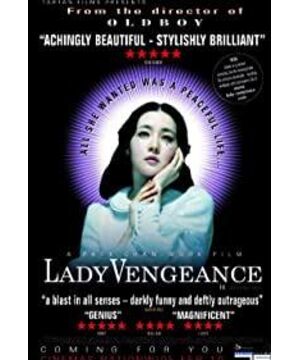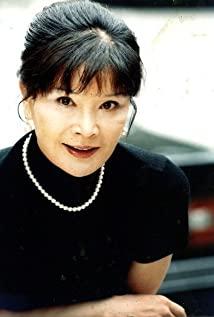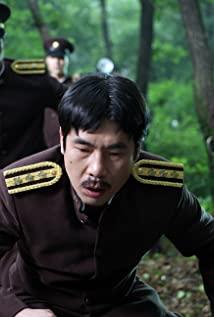Kaneko: If I can judge or even execute punishment... if I have
to deal with the relationship between religion and revenge, I will easily fall into the duality of good and evil, or the conventional wisdom of original sin and redemption. Of course, "Kindly Gold" did not leave these revenge themed factors, but when it was shot, it was quite different. On the one hand, Kaneko stands in the position of the Virgin: she is always kind, shining with golden light in a prison full of sins; on the other hand, she is an avenger, and she will never forgive! So this "kind gold" has a smile on the one hand, and murderous intent on the other: it is both a Virgin and a witch. More importantly, gold is full of charm: she is kind-people who receive her favor will always help her in revenge; she is beautiful-red eyeshadow, red high heels, a kind of inhuman and intuitive Beautiful, regretful, unable to resist; she is kind-so her gun will hear the heartbeat and see the dripping of sweat up close. The multiplicity of gold extends to the level of religion. It has subverted and even overturned the purification function of religion: as soon as the scene opened, the priest dropped the priest’s tofu on the ground, and later the priest collected money from others...
not only that, the director took the role of gold Push to a more thorough corner. Her revenge plan was successful. She could be tried and even executed: she shot Mr. Bai's foot with a gun, and Mr. Bai could no longer escape and went to the execution ground-it shows that Jin Jin has the power to set the execution ground. More importantly, how to understand that Kaneko stands in a religious position? At the end of the film, Kaneko used the video tape to bring the truth to everyone: she always knew all the truth, and ignored the agents present (laws and rational norms lost their binding force). In the whole situation of revenge, Jin Jin is in the highest position: she can instigate the execution of the victims and legalize/rationalize the execution. During the execution, she only showed her eyes and looked on with cold eyes.
The door of execution
The execution is undoubtedly the most exciting part of the movie. Kaneko's kindness played the biggest role: the standard of the entire trial and execution-she became the supreme commander of moral values, no one doubted her ability to judge, only obedience. It should be noted that what this trial has to deal with is no longer the superficial ethical propositions such as the retribution of evil and the eye for an eye, but revenge is used to fill the gap in a world, and in turn present the gap more clearly. .
The gap in this world is disaster: the victim witnessed the death of his child. There is no way to rephrase this terrifying and fatal injury. Our intuition is aware of the big gap and abyss in this life. And reason (such as the power of the court) is simply not enough to fill this gap. So the moral laws represented by religion intervene and fill this gap: good is rewarded, evil is rewarded, eye for eye, tooth for tooth, a person who does bad things deserves to be punished! The means of punishment is direct revenge: the pleasure of being a knife and death coexist. Only revenge can fill the abyss of disaster. However, the brilliance of "Kindly Gold" lies in its awareness: filling and exposing go hand in hand.
What exposed the impossibility of filling is the sound of sliding doors in and out of the execution ground. While all the victims were waiting for the execution, when the door opened, they all showed a look of fear-to be executed or to be tortured? At this particular moment, they felt horrified, cold with revenge, and they hesitated... These expressions are exposing the loopholes in execution: revenge, is it okay? Is it effective?
Birthday cake: The
director of the illusion angel certainly provided the answer for this revenge. The disaster did not disappear because of the intervention of moral laws. After the execution, the victims seemed to be reborn: they shared birthday cakes and shared the same taste. They saw angels flying over their heads: Good always guarded them silently by their side. But in the end, this group of victims who share the same taste still hope to get the redemption, and they will also ask: will it be difficult to walk when it snows? Then they went back to their own lives. When Kaneko erased the vengeful eyeshadow and imagined the victimized child, she could not speak, but could only watch his disappearance feebly: Revenge brought her into the wilderness of life.
Tears of revenge
The modern Chinese writer Zhang Ailing once had a shocking metaphor in her novel "The Blockade": "Life is like the Bible, translated from Hebrew to Greek, from Greek to Latin, from Latin to English, from English translated into Mandarin. When Cuiyuan (the heroine in the novel) read it, Mandarin was translated into Shanghai dialect in her mind. It was a bit of a gap." Jin's daughter is the object of Jin's love. The relationship between her and her daughter is exactly the relationship between religion and people: the separation of communication and the distance of translation. The daughter speaks English, Kaneko speaks Korean, and their intermediary is a dictionary. While revealing the limitations of language, it also shows the powerlessness of religious/moral laws: in the last scene of the movie, they "look up" at the "white snow" falling from the sky-people are always looking up, standing on a low Location; and Jin Jin is wearing "black" clothes-there is no perfect person in the world. She never ate the white food--but she was always eager for it. Gold shed tears of revenge because she saw an unfilled gap in the world, realized the deep despair in her life, and at the same time marked a sad end to the revenge trilogy.
http://ericlwk.blogspot.com/
View more about Lady Vengeance reviews











